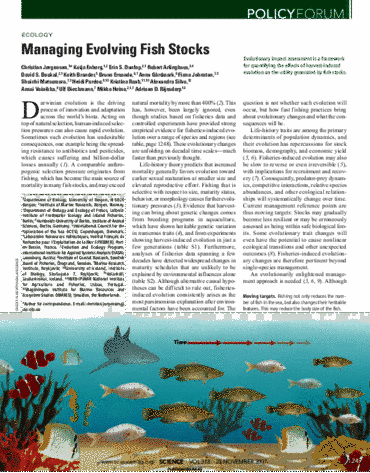Darwinian evolution is the driving process of innovation and adaptation across the world’s biota. Acting on top of natural selection, human-induced selection pressures can also cause rapid evolution. Sometimes such evolution has undesirable consequences, one example being the spreading resistance to antibiotics and pesticides, which causes suffering and billion-dollar losses annually (1). A comparable anthropogenic selection pressure originates from fishing, which has become the main source of mortality in many fish stocks, and may exceed natural mortality by more than 400% (2). This has, however, been largely ignored, even though studies based on fisheries data and controlled experiments have provided strong empirical evidence for fisheries-induced evolution over a range of species and regions (see table, page 1248). These evolutionary changes are unfolding on decadal time scales—much faster than previously thought.
Managing evolving fish stocks
Rezensierter Artikel

Jørgensen, C., Enberg, K., Dunlop, E. S., Arlinghaus, R., Boukal, D. S., Brander, K., Ernande, B., Gårdmark, A., Johnston, F., Matsumura, S., Pardoe, H., Raab, K., Silva, A., Vainikka, A., Dieckmann, U., Heino, M., Rijnsdorp, A. D. (2007). Managing evolving fish stocks. Science, 318, 1247-1248
Veröffentlicht
: 2007
Erschienen in
: Science, 318, 1247-1248
